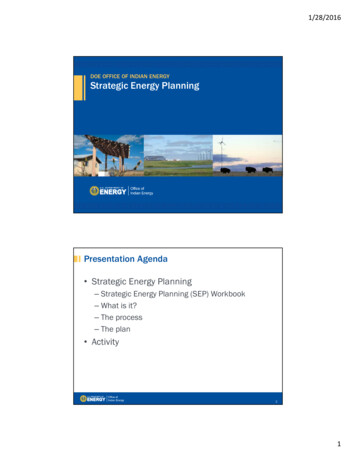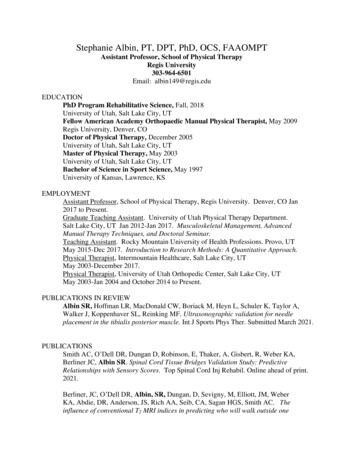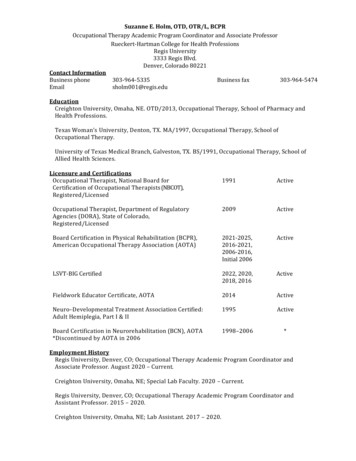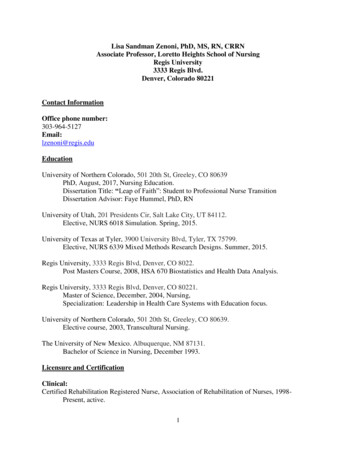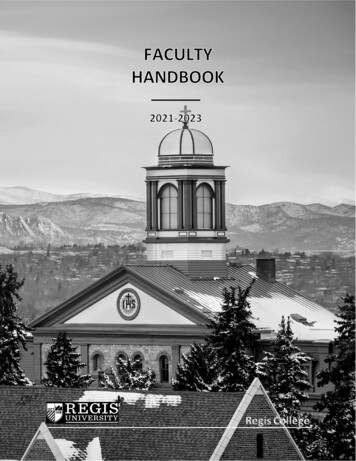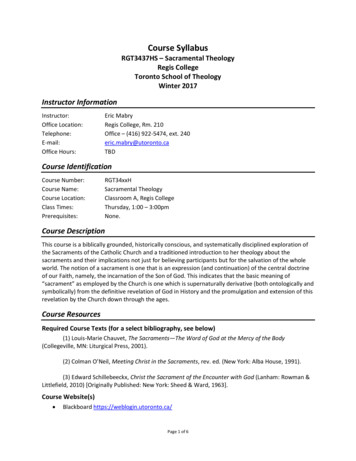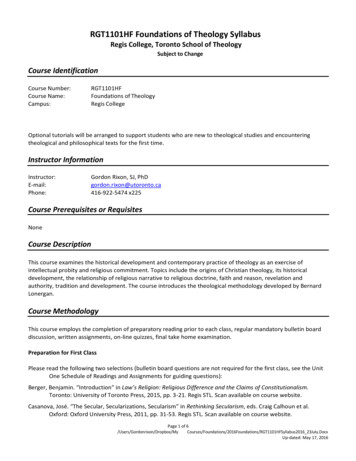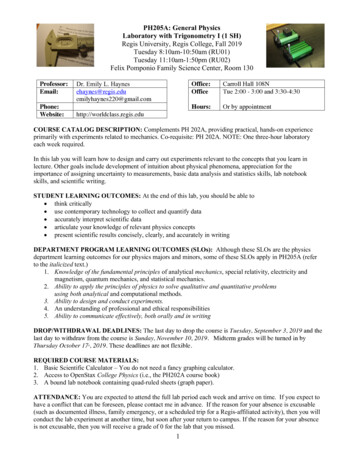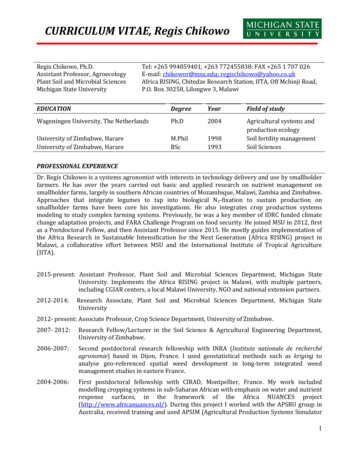
Transcription
CURRICULUM VITAE, Regis ChikowoRegis Chikowo, Ph.D.Assistant Professor, AgroecologyPlant Soil and Microbial SciencesMichigan State UniversityEDUCATIONTel: 265 994859401, 263 772455838: FAX 265 1 707 026E-mail: chikowor@msu.edu; regischikowo@yahoo.co.ukAfrica RISING, Chitedze Research Station, IITA, Off Mchinji Road,P.O. Box 30258, Lilongwe 3, MalawiWageningen University, The NetherlandsUniversity of Zimbabwe, HarareUniversity of Zimbabwe, HararePROFESSIONAL EXPERIENCEDegreeYearField of studyPh.D2004Agricultural systems andproduction ecologySoil fertility managementSoil SciencesM.PhilBSc19981993Dr. Regis Chikowo is a systems agronomist with interests in technology delivery and use by smallholderfarmers. He has over the years carried out basic and applied research on nutrient management onsmallholder farms, largely in southern African countries of Mozambique, Malawi, Zambia and Zimbabwe.Approaches that integrate legumes to tap into biological N2-fixation to sustain production onsmallholder farms have been core his investigations. He also integrates crop production systemsmodeling to study complex farming systems. Previously, he was a key member of IDRC funded climatechange adaptation projects, and FARA Challenge Program on food security. He joined MSU in 2012, firstas a Postdoctoral Fellow, and then Assistant Professor since 2015. He mostly guides implementation ofthe Africa Research in Sustainable Intensification for the Next Generation (Africa RISING) project inMalawi, a collaborative effort between MSU and the International Institute of Tropical Agriculture(IITA).2015-present: Assistant Professor, Plant Soil and Microbial Sciences Department, Michigan StateUniversity. Implements the Africa RISING project in Malawi, with multiple partners,including CGIAR centers, a local Malawi University, NGO and national extension partners.2012-2014:Research Associate, Plant Soil and Microbial Sciences Department, Michigan StateUniversity2007- 2012:Research Fellow/Lecturer in the Soil Science & Agricultural Engineering Department,University of Zimbabwe.2012- present: Associate Professor, Crop Science Department, University of Zimbabwe.2006-2007:2004-2006:Second postdoctoral research fellowship with INRA (Institute nationale de recherchéagronomie) based in Dijon, France. I used geostatistical methods such as kriging toanalyse geo-referenced spatial weed development in long-term integrated weedmanagement studies in eastern France.First postdoctoral fellowship with CIRAD, Montpellier, France. My work includedmodelling cropping systems in sub-Saharan African with emphasis on water and nutrientresponse surfaces, in the framework of the Africa NUANCES project(http://www.africanuances.nl/). During this project I worked with the APSRU group inAustralia, received training and used APSIM (Agricultural Production Systems Simulator1
2004:model) extensively. Coefficients developed using the dynamic APSIM model wereintegrated into summary modeling frameworks (e.g. FIELD, FARMSIM), to analyzetradeoffs in production at farm scale on smallholder farms in diverse agro-ecologicalregions of sub Saharan Africa.Research Fellow with Tropical Soil Biology and Fertility Program (TSBF) in Harare,ZimbabweRESEARCH INTERESTS Nutrient cycling on smallholder farms in Africa – designing cropping sequences to align with farmsocio-economic circumstances (legume –cereal sequences, intercropping, integrated soil fertilitymanagement)Investigations on soil- water interactions through low cost practices that have potential for adoptionby risk averse small farms in AfricaSoil organic carbon dynamics and cereal productivity along soil fertility gradients/toposequencesHONORS AND PROFESSIONAL ACCOMPLISHMENTS2019201720162010-to dateInvited speaker at the Scaling Mega -Symposium: during the ‘Embracing the DigitalEnvironment’ annual meeting of the 2019 ASA, SSSA and CSSA, San Antonio, November,9-13.Invited speaker at the Special Session Symposium: the U.S. Global Food Security Strategyduring the ‘Managing Global Resources for a Secure Future’ annual meeting of the ASA,SSSA and CSSA, Tampa, Florida, 22-25 October, 2017Organizing scientific team member for the Joint Pan-African Grain Legume and WorldCowpea International Conference, 28 February to 4 March 2016, Victoria FallsResort, Livingstone, ZambiaExternal examiner, Ph.D dissertations, Plant Production Systems Group, WageningenUniversity2007 to date: External examiner, University of KwaZulu Natal (KZN), South Africa20012000Rockefeller Foundation Ph.D Scholarship AwardInternational Foundation for Sciences (IFS) scholar awardPUBLICATIONS (Google Scholar H index 30; Research Gate Score 30.1)1. Regis Chikowo, John Olwande, Maria Wanzala, Mary Lubungu, Hambulo Ngoma, Pedro Sanchez.2021. Opportunities for Building Resilience of African Farming Systems In; AGRA AfricaAgriculture Status Report. A Decade of Action: Building Sustainable and Resilient FoodSystems in Africa (Issue 9). Nairobi, Kenya: Alliance for a Green Revolution in Africa (AGRA). Pp68-92.2. Regis Chikowo, Rowland Chirwa. Job Kihara, Sieglinde Snapp 2022. Cereal-legume croppingsystems for enhanced productivity, food security and resilience. In Bekunda, M., Hoeschle-2
Zeledon, I., & and Odhong J. (Eds). A handbook of approaches in sustainable agriculturalintensification for farmers in East and Southern Africa. Pp 33-47. CABI.3. Fred Kizito, Regis Chikowo, Anthony Kimaro, Elirehema Swai. 2022. Soil and water conservationfor climate resilience. In Bekunda, M., Hoeschle-Zeledon, I., & and Odhong J. (Eds). A handbook ofapproaches in sustainable agricultural intensification for farmers in East and Southern Africa. Pp62-79. CABI.4. Mateete Bekunda, Regis Chikowo, Lieven Claessens, Irmgard Hoeschle-Zeledon, Job Kihara, FredKizito, Patrick Okori, N’Danikou Sognigbe, Christian Thielfelder 2022. Combining multipletechnologies: Integrated soil fertility management. In Bekunda, M., Hoeschle-Zeledon, I., & andOdhong J. (Eds). A handbook of approaches in sustainable agricultural intensification for farmersin East and Southern Africa. Pp 134-144. CABI.5. Haroon Sseguya, Regis Chikowo, Vimbayi Chimonyo, Felistus Chipungu, Jeroen Groot, FrancisMuthoni, Festo Ngulu, Christian Thierfelder 2022. Taking technologies to greater scale. . InBekunda, M., Hoeschle-Zeledon, I., & and Odhong J. (Eds). A handbook of approaches insustainable agricultural intensification for farmers in East and Southern Africa. Pp 145-156.CABI.6. Peter G. Brad, Joseph, P Messina, Carrol W. Jon, Chikowo, Regis 2021.A case for greenbased vegetation indices: plot-scale sUAS imagery related to crop chlorophyll content onsmallholder maize farms in Malawi Remote Sensing Letters 12: 778-787.7. John, Innocensia, Snapp, Sieglinde, Nord, Alison, Chimonyo, Vimbayi, Gwenambira,Chiwimbo, Chikowo, Regis. 2021. Marginal more than mesic sites benefit from groundnutdiversification of maize: Increased yield, protein, stability, and profits. Agriculture,Ecosystems & Environment. 320: 107585.8. Giller, Ken & Delaune, Thomas & Silva, João & Descheemaeker, Katrien & Ven, Gerrie W.J.& Schut, A.G.T. & Van Wijk, Mark & Hammond, James & Hochman, Zvi & Taulya, G. &Chikowo, Regis & Narayanan, Sudha & Kishore, Avinash & Bresciani, Fabrizio & Teixeira,Heitor & Andersson, Jens & Ittersum, Martin. 2021. The future of farming: Who will produceour food? Food Security. 13. 10.1007/s12571-021-01184-6.9. Giller, Ken & Delaune, Thomas & Silva, João & Van Wijk, Mark & Hammond, Jim &Descheemaeker, Katrien & Ven, Gerrie W.J. & Schut, A.G.T. & Taulya, G. & Chikowo, Regis &Andersson, Jens. 2021. Small farms and development in sub-Saharan Africa: Farming for food, forincome or for lack of better options? Food Security. 10.1007/s12571-021-01209-0.10. Chiwimbo Gwenambira-Mwika, Sieglinde S Snapp, Regis Chikowo. 2021. Broadening farmeroptions through legume rotational and intercrop diversity in maize based cropping systems ofcentral Malawi. Field Crops Research 270: https://doi.org/10.1016/j.fcr.211. Shamie Zingore, Samuel Njoroge, Stephen Ichami, Kokou Adambounou Amouzou, James Mutegi,Regis Chikowo, Sudarshan Dutta, Kaushik Majumdar 2021.The effects of soil organic matter andorganic resource management on maize productivity and fertilizer use efficiencies in Africa. In3
Lal R (Ed).Soil Organic Carbon and Feeding the Future: Crop Yield and Nutritional Quality. Pp127-153. DOI: 10.1201/9781003102762-5. CRC press.12. Talent Namatsheve, Regis Chikowo, Marc Corbeels, Claire Mouquet-Rivier, Christèle IcardVernière, Rémi Cardinael 2021. Maize-cowpea intercropping as an ecological intensificationoption for low input systems in sub-humid Zimbabwe: Productivity, biological N2-fixation andgrain mineral content. Field Crops Research 263(1):108052. DOI: 10.1016/j.fcr.2020.10805213. Chipomho Justin, Parwada Cosmas, Rugare Joyful T, Mabasa Stanford, Chikowo, Regis,Mashingaidze, Arnold B 2021.Influence of soil organic carbon, fertilizer management, andweeding regime on weed dynamics and maize productivity on sandy soils in eastern Zimbabwe.South African Journal of Plant and Soil. Taylor & Francis14. Justin Chipomho, Joyful T. Rugare, Stanford Mabasa, Shamie Zingore, Arnold Bray Mashingaidze,Regis Chikowo 2020. Short-term impacts of soil nutrient management on maize (Zea mays L.)productivity and weed dynamics along a toposequence in Eastern Zimbabwe. Heliyon 6:e05223. //doi.org/10.1016/j.heliyon.2020.e05223.15. Talent Namatsheve, Rémi Cardinael, Marc Corbeels, Regis Chikowo 2020. Productivity andbiological N2-fixation in cereal-cowpea intercropping systems in sub-Saharan Africa. A review.Agronomy for Sustainable Development 40(30):1-12. DOI: 10.1007/s13593-020-00629-016. Regis Chikowo, Vimbayi Chimonyo, Chiwimbo Gwenambira, Sieg Snapp 2019. Ecosystemservices in doubled-up legume systems. In: The Role of Ecosystem Services in Sustainable FoodSystems, Ed. L. Rusinamhodzi. (Ed). pp 171-180. Elsevier.17. Chikowo, Regis; Chimonyo, Vimbayi; Gwenambira, Chiwimbo; Snapp, Sieg .2020. Ecosystemservices in doubled-up legume systems: The Role of Ecosystem Services in Sustainable FoodSystems 171-1802020 Elsevier18. Marc Corbeels, Remi Cardinael, David Powlson, Regis Chikowo, Bruno Gerard. 2019. Carbonsequestration potential through conservation agriculture in Africa has been largelyoverestimated. Comment on: Meta-analysis on carbon sequestration through conservationagriculture in Africa. Soil Tillage and Research , https://doi.org/10.1016/j.still.2019.10430019. Chimonyo VGP, Snapp S, Chikowo R 2019. Grain Legumes Increase Yield Stability in Maize BasedCropping Systems. Crop Science 59: 1222–1235. doi:10.2135/cropsci2018.09.053220. Vongai Chekanai, Regis Chikowo, Bernard Vanlauwe 2018. Response of common bean(Phaseolus vulgaris L.) to nitrogen, phosphorus and rhizobia inoculation across variable soils inZimbabwe. Agriculture Ecosystems & Environment 266:167-173.21. Nyasha Kafesu, Regis Chikowo, Upenyu Mazarura, Willis Gwenzi, Sieg Snapp, Shamie Zingore2018. Comparative fertilization effects on maize productivity under conservation andconventional tillage on sandy soils in a smallholder cropping system in Zimbabwe. Field CropsResearch 218: 106–114.4
22. Zulu, L.C., Adams, E.A., Chikowo, R. and Snapp, S., 2018. The role of community-based livestockmanagement institutions in the adoption and scaling up of pigeon peas in Malawi. Food Policy,79, pp.141-155.23. Snapp, S.S., P. Grabowski, R. Chikowo, A. Smith, E. Anders, D. Sirrine, V. Chimonyo and M.Bekunda. 2018. Maize yield and profitability tradeoffs with social, human and environmentalperformance: Is sustainable intensification feasible? Agricultural Systems 162: 77-88.24. Snapp, S.S., Rogé, Okori, P., Chikowo, R., Peter, B., and Messina, J.P. 2018. Perennial grains forAfrica: Possibility or pipedream? Experimental Agriculture 1-22.25. Galand G, Bunemann EK, Oberson A, Frossard E, Snapp S, Chikowo R, Six, J 2018. Phosphoruscycling within soil aggregate fractions of a highly weathered tropical soil: A conceptual model.Soil Biology and Biochemistry 116:91-98.26. Leah M. Mungai, Sieglinde Snapp, Joseph P. Messina, Regis Chikowo, Alex Smith, ErinAnders, Robert B. Richardson, Guiying Li. 2016. Smallholder Farms and the Potential 7. Martin K. van Ittersum, Lenny G. J. van Bussel, Joost Wolf, Patricio Grassini, Justin van Wart,Nicolas Guilpart, Lieven Claessens, Hugo de Groot, Keith Wiebe, Daniel Mason-D’Croz, HaishunYang, Hendrik Boogaard, Pepijn A. J. van Oort, Marloes P. van Loon, Kazuki Saito, Ochieng Adimo,Samuel Adjei-Nsiah, Alhassane Agali, Abdullahi Bala, Regis Chikowo, Kayuki Kaizzi, MamoutouKouressy, Joachim H. J. R. Makoi, Korodjouma Ouattara, Kindie Tesfaye, Kenneth G. Cassman.2016. Can sub-Saharan Africa feed itself? Proceedings of the National Academy of Sciences.113:14964–14969. DOI: 10.1073/pnas.1610359113.28. Alex Smith, Sieglinde Snapp, Regis Chikowo, Peter Thorne, Mateete Bekunda, Jerry Glover. 2016.Measuring sustainable intensification in smallholder agroecosystems: A review. Global FoodSecurity. http://dx.doi.org/10.1016/j.gfs.2016.11.00229. Smith, A., Snapp, S., Dimes, J., Gwenambira, C., and Chikowo R. 2016. Doubled-up legumerotations improve soil fertility and maintain productivity under variable conditions in maizebased cropping systems in Malawi. Agric. Syst. 145: 139–149.30. Andrew Farrow, Ester Ronner, Greta J. Van Den Brand, Stephen K. Boahen, Wilson Leonardo,Endalkachew Wolde-Meskel, Samuel Adjei-Nsiah, Regis Chikowo, Fredrick Baijukya, PeterEbanyat, Emmanuel A. Sangodele, Jean-Marie Sanginga, Speciose Kantengwa, Lloyd Phiphira,Paul Woomer, Theresa Ampadu-Boakye, Edward Baars, Fred Kanampiu, Bernard Vanlauwe,Kenneth E. Giller 2016. From best fit technologies to best fit scaling: incorporating andevaluating factors affecting the adoption of grain legumes in sub-Saharan Africa. 2016.Experimental Agriculture: 1-26. DOI: 10.1017/S0014479716000764.31. Chikowo R, Zingore S, Nyamangara J, Bekunda M, Messina J, Snapp S 2015. Approaches toreinforce crop productivity under water-limited conditions in sub-humid environments in Africa.5
In Sustainable Intensification to advance Food Security and Enhance Climate Resilience in Africa(Lal R, Mwase D, Hansen D, Eds). Springer. DOI: 10.1007/978-3-319-09360-4 12.32. Kurwakumire N, Chikowo R, Zingore S, Mtambanengwe F, Mapfumo, P, Snapp S, Johnston A.2015. Nutrient Management Strategies on Heterogeneously Fertile Granitic-derived Soils in Subhumid Zimbabwe. Agronomy Journal. 107:1068-1076.33. Mapfumo P, Mtambanengwe F, Chikowo R, 2015. Building on indigenous knowledge tostrengthen the capacity of smallholder farming communities to adapt to climate change andvariability in southern Africa. Climate and Development 8: 72-82.34. Chikowo, R., Zingore, S. Snapp S, Johnston A, 2014. Farm typologies, soil fertility variability andnutrient management in smallholder farming in Sub-Saharan Africa. Nutrient Cycling inAgroecosystems 100: 1-18.35. Kurwakumire N, Chikowo, R., Mtambanengwe, F., Mapfumo, P., Snapp, S., Johnston, A., Zingore, S.2014. Maize productivity and nutrient and water use efficiencies across soil fertility domains onsmallholder farms in Zimbabwe. Field Crops Research 164: 136-147.36. Zingore S, Njoroge S, Chikowo R, Kihara J, Nziguheba G, Nyamangara J 2014. 4R Plant Nutrientmanagement in Africa Agriculture. An extension handbook for fertilizer management insmallholder farming systems. International Plant nutrition Institute, 94 pages.37. Rurinda J, Mapfumo P, van Wilk MT., Mtambanengwe F, Rufino MC, Chikowo R, Giller KE. 2014.Sources of vulnerability to a variable and changing climate among smallholder households inZimbabwe: A participatory analysis. Climate Risk Management 3:65-78.38. Nezomba H, Mtambanengwe F, Chikowo R, Mapfumo P, 2014. Sequencing integrated soil fertilitymanagement options for sustainable crop intensification by different categories of smallholderfarmers in Zimbabwe. Experimental Agriculture. 51: 17-41.39. Rurinda J, Mapfumo P, van Wilk MT, Mtambanengwe F, Rufino MC, Chikowo R, Giller KE. 2014.Comparative assessment of maize, finger millet and sorghum for household food security in theface of increasing climatic risk. European Journal of Agronomy; 55:29–41.40. Gwandu T, Mtambanengwe F., Mapfumo P, Mashavave TC, Chikowo R, Nezomba H 2014. Factorsinfluencing access to integrated soil fertility management information and knowledge and itsuptake among smallholder farmers in Zimbabwe. Journal of Agricultural Education andExtension 20: 79-93.41. Nyamangara J, Chikowo R, Rusinamhodzi L, Mazvimavi K. 2013. Conservation agriculture insouthern Africa. In: RA Jat, KL Sahrawat, AH Kassam (Eds.) Conservation agriculture: Globalprospects and challenges. CABI, Wallingford, U.K. pp 339-351.Mapfumo P, Adjei-Nsiah S,42. Mtambanengwe F, Chikowo R, Giller KE 2013. Participatory action research (PAR) as an entrypoint for supporting climate change adaptation by smallholder farmers in Africa. EnvironmentalDevelopment 5: 5-226
43. Rurinda J, Mapfumo P, van Wilk MT., Mtambanengwe F, Rufino MC, Chikowo R, Giller KE. 2013.Managing soil fertility to adapt to rainfall variability in smallholder cropping systems inZimbabwe. Field Crops Research 154: 211-225.44. Mtambanengwe F, Mapfumo P, Chikowo R, Chamboko T 2012. Climate change and variability:smallholder farming communities in Zimbabwe portray varied understanding. African CropScience Journal 20: 259-273.45. Manzeke G, Mapfumo P, Mtambanengwe F, Chikowo R, Tendayi T, Cakmak I, 2012. Maizeproductivity and grain zinc nutritional value as affected by different soil fertility managementpractices in smallholder farming systems of Zimbabwe. Plant and Soil 361: 57-69.46. Nyamadzawo G, Nyamugafata P, Wuta M, Nyamangara J, Chikowo R, 2012. Infiltration and runofflosses under fallowing and conservation agriculture practices on contrasting soils fromZimbabwe. Water SA 38(2): 233-240.47. Chikowo R, 2011. Climatic risk analysis in conservation agriculture in varied biophysical andsocio-economic settings of Southern Africa. Network Paper 3 Food and Agricultural Organizationof the United Nations (FAO), Johannesburg. 40 p.48. Giller K.E., Tittonell P., Rufino M.C., Wijk M.T., Zingore S., Mapfumo P., Adjei-Nsiah S., Herrero M.,Chikowo R., Corbeels M., Rowe E.C., Baijukya F., Mwijage A., Smith J., Yeboah E., Burg W.J.v.d.,Sanogo O.M., Misiko M., Ridder N.d., Karanja S., Kaizzi C., K’ungu J., Mwale M., Nwaga D., Pacini C.,Vanlauwe B. 2011. Communicating complexity: Integrated assessment of trade-offs concerningsoil fertility management within African farming systems to support innovation anddevelopment. Agricultural Systems 104: 191–203.49. Tittonell P., Scopel E., Andrieu N., Posthumus H., Mapfumo P., Corbeels M., van Halsema G.E.,Lahmar R., Lugandu S., Rakotoarisoa J., Mtambanengwe F., Pound B., Chikowo R., Naudin K.,Triomphe B., and Mkomwa S. 2012. Agroecology-based aggradation-conservation agriculture(ABACO): Targeting innovations to combat soil degradation and food insecurity in semi-aridAfrica. Field Crops Research 132: 168-174.50. Chikowo R, Corbeels M, Mapfumo P, Tittonell P, Vanlauwe B, Giller KE 2010. Nitrogen andphosphorus capture and recovery efficiencies and crop responses to a range of soil fertilitymanagement strategies in sub-Saharan Africa. Nutrient Cycling in Agroecosystems. 88: 59-77.51. Chikowo, R, Faloya V, Petit S. and Munier-Jolain, N.M. 2009. Integrated weed managementsystems allow reduced reliance on herbicides and long-term weed control. Agriculture,Ecosystems and Environment. 132:237-242.52. Chikowo R, Corbeels M, Tittonell P, Vanlauwe B, Whitbread A, Giller KE 2008. Aggregating fieldscale knowledge into farm-scale models of African smallholder systems: Summary functions tosimulate crop production using APSIM. Agricultural Systems 97: 151-166.53. Nyamadzawo G, Chikowo R, Nyamugafata P, Nyamangara J, Giller KE 2008. Soil organic carbondynamics of improved fallow-maize rotation systems under conventional and no-tillage inCentral Zimbabwe. Nutrient Cycling in Agroecosystems 81: 85 – 93.7
54. Nyamadzawo G , Chikowo R, Nyamugafata P, Nyamangara J and Giller KE 2008. Residual effectsof fallows on selected soil hydraulic properties in a kaolinitic soil subjected to conventionaltillage (CT) and no tillage (NT). Agroforestry Systems 72: 161-168.55. Zingore S, Chikowo R, Nyamadzawo G, Nyamugafata P, Mafongoya P.L. 2007. Developments inthe Research of the Potential of Agroforestry for Sustaining Soil Fertility in Zimbabwe. In:Ecological Basis of Agroforestry. Daizy R. Batish, Ravinder K. Kohli, Panjab Shibu Jose, HarminderP. Singh (Eds.) CRC Press, 400 pp.56. Nyamadzawo G, Chikowo R, Nyamugafata P, Giller KE. 2007. Improved legume tree fallows andtillage effects on structural stability and infiltration rates of a kaolinitic sandy soil from centralZimbabwe. Soil & Tillage Research 96: 182-194.57. Chikowo R, Mapfumo P, Leffelaar P A and Giller KE 2006. Integrating legumes to improve Ncycling on smallholder farms in sub-humid Zimbabwe: Resource quality, biophysical andenvironmental limitations. Nutrient Cycling in Agroecosystems. 76: 219-231.58. Chikowo R, Mapfumo P, Nyamugafata P, Giller KE 2004. Woody legume fallow productivity,biological N2- fixation and residual benefits to two successive maize crops in Zimbabwe. PlantSoil 262: 303-315.59. Chikowo R, Mapfumo P, Nyamugafata P and Giller KE 2004. Mineral N dynamics, leaching andnitrous oxide losses under maize following two-year improved fallows on a sandy loam soil inZimbabwe. Plant Soil 259: 315-330.60. Chikowo R, Mapfumo P, Nyamugafata P and Giller KE 2004. Maize productivity and mineral Ndynamics following different soil fertility management technologies on a depleted sandy soil inZimbabwe. Agriculture Ecosystems & Environment 102:119-131.61. Chikowo R, Mapfumo P, Nyamugafata P, Nyamadzawo G and Giller KE 2003. Nitrate-N dynamicsfollowing improved fallows and spatial maize root development in a Zimbabwean sandy clayloam. Agroforestry Systems 59: 187-195.62. Nyamadzawo G, Nyamugafata P, Chikowo R and Giller KE 2003. Partitioning of simulated rainfallin a kaolinitic soil under improved fallow-maize sequence in Zimbabwe. Agroforestry Systems59: 207-214.63. Nyamadzawo G, Nyamugafata P, Chikowo R, Chirwa T and Mafongoya P L 2005. Soil and carbonlosses under rainfall simulation from two contrasting soils under maize-improved fallowsrotation in eastern Zambia. In: Soil Erosion and Carbon Dynamics. Roose EJ, Lal R, Feller C,Barthes B and Stewarts B A (Eds.). CRC Press, Taylor and Francis Group. Boca Raton USA. Pp.197-206.64. Chikowo R, Tagwira F and Piha M 1999. Agronomic effectiveness of poor quality manuresupplemented with P fertilizer in a maize-groundnut rotation. African Crop Science Journal 7:383-395.8
65. Murwira H.K., Tagwira F., Chikowo R., Waddington SR., 1998. An evaluation of the agronomiceffectiveness of low rates of cattle manure and combinations of inorganic N in Zimbabwe. In: SoilFertility Research for Maize-based Farming Systems in Malawi and Zimbabwe. Waddington SR,Murwira HK, Kumwenda JDT, Hikwa D and Tagwira F (EDs). Soil Fert Net, CIMMYT. Harare,Zimbabwe. P. 179-182.EXTENSION BULLETINS1. Chikowo, Regis, Snapp, Sieglinde, Vanlauwe, Bernard. 2020. Doubled-up legumes technologyAfrica RISING Technology Brief. International Institute of Tropical Agriculture2. Chikowo, R. and S. Snapp, Irmgard Hoeschle-Zeledon, 2016. Groundnut Production in Malawi:The cash 'cow' and butter that nourishes families. Brief No. 9. Africa RISING and Michigan StateUniversity. Africa-rising.net3. Chikowo, R. and S. Snapp, Irmgard Hoeschle-Zeledon, 2016 Soyabean: A versatile grain legumefor smallholder farmers in Malawi. Brief No. 10. Africa RISING and Michigan State University.Africa-rising.net4. Chikowo, R. and S. Snapp, Irmgard Hoeschle-Zeledon, 2016. Doubled-up legume technology:Boosting land productivity by intercropping two grain legumes with different growth habits.Brief 11. Africa RISING and Michigan State University. Africa-rising.net5. Odhong, J., Chikowo, R., Hoeschle-Zeledon, I. and Snapp, S. 2016. How does a farm family inMalawi produce more from their farm. Infographic. Ibadan, Nigeria: IITA.6. Odhong, J., Chikowo, R., Hoeschle-Zeledon, I. and Snapp, S. 2016. Different strokes for differentfolks: 3-year doubled-up legume cropping cycles for contrasting farms in Malawi. Infographic.Ibadan, Nigeria: IITA.GRANTS/PROPOSALS SUBMITTED2021: Catholic Relief Services (CRS): Calibration and validation of the Our Sci Reflectometer forthe measurement of soil organic carbon in Lesotho, Madagascar, Nicaragua, andGuatemala 114,000 for 2022 implementation2021. Last Mile Services in Malawi: Inclusive delivery of localized soil, weather and marketinformation. BMGF digital seed grant (250,000) (NOT FUNDED)2020: ALL IN: Agronomy and extension innovations hinged on information communicationtechnology for advancing intensification and resilience on smallholder farms insub-humid Malawi ( 360,000) (NOT FUNDED02019 (August) Travel Grant, Alliance for African Partnerships, Plant Soil Microbial SciencesDept, MSU ( 17,000)2019-2022Agropolis/Total Foundation DSCATT project, 115,000, University of Zimbabwe2012-2021USAID (subcontract with IITA) ‘Sustainable intensification of maize basedsystems in SE Africa’ 3,200,000 (Co-PI, Dr Snapp)2008-2012International Plant nutrition Institute (IPNI) – University of Zimbabwe( 250,000)2007-2009RUFORUM, – University of Zimbabwe CO-PI, ( 60,000)9
ACADEMIC ADVISING (SINCE 2014)StudentsPhDJairos RurindaHatirarami NezombaChiwimbo GwenambiraJustin ChipomhoArmwell ShumbaRumbidzai NyawashaMSc/MPhilNatasha KurwakumireSibusiso MaposaGrace ManzekeTongai MtangaduraEdward MzumaraNyasha KafesuVongai ChekanaiTalent NematsveveMlambo CephasJester KalumbaChifuniro Kalawang'omaProfessional membershipsAmerican Society of Agronomy (ASA)Zimbabwe Crop Science SocietyZimbabwe Soil Science SocietyUniversityWageningen UniversityUniversity of ZimbabweMichigan State UniversityUniversity of ZimbabweUniversity of ZimbabweUniversity of ZimbabweUniversity of ZimbabweUniversity of ZimbabweUniversity of ZimbabweUniversity of ZimbabweLUANARUniversity of ZimbabweUniversity of ZimbabweUniversity of ZimbabweUniversity of ZimbabweLUANARLUANARWhen graduated orcurrent student201520152020PhD Thesis submittedCurrent PhDCurrent PhD20142014201520162015201820182019Current studentCurrent studentCurrent studentJournal article reviews, primarily for the following journals1. Field Crops Research2. Agriculture, Ecosystems and Environment3. Agricultural Systems4. Plant and Soil5. Experimental Agriculture6. Agronomy Journal10
Michigan State University . Tel: 265 994859401, 263 772455838: FAX 265 1 707 026 . Dr. Regis Chikowo is a systems agronomist with interests in technology delivery and use by smallholder . during the 'Managing Global Resources for a Secure Future' annual meeting of the ASA, SSSA and CSSA, Tampa, Florida, 22-25 October, 2017 .

